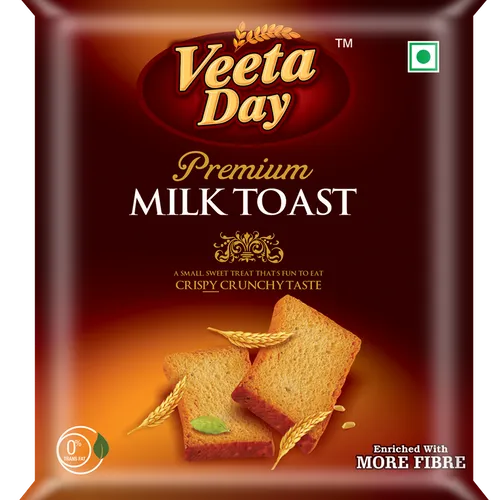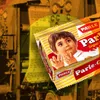How this Lucknow-based rusk brand revived after a failed product to clock Rs 25 Cr turnover in just 5 years
Veetaday overcame the initial failure of its cookies to pivot and become a popular rusk brand in eight Indian states. Read to find out how the brand did it.
When Lucknow-based brothers Raghav Agarwal and Arjun Agarwal started cookie brand 'Veetaday' in 2014, they didn't expect to shut their entire cookie division in just two years.
After their premium cookies (which were costly to make) did not sell well enough, closing it down was inevitable.
Raghav, who is also Director of the company, tells SMBStory:
"2015 and 2016 were tough. We struggled a lot because of the low cookie sales. When we stopped making our main product, the whole team was demotivated because it meant our product failed and our huge investments were gone."
But the brothers soldiered on. They were not ready to declare the business a failure, and discovered that in fact, they already had an ace in the hole.
Alongside cookies, Veetaday used to make rusks (milk toasts). They weren't the focus of the brand, but they were doing so well that Veetaday pivoted completely to become a rusk brand.
"Over three years, our rusks became popular across Punjab, Haryana, Delhi-NCR, Jammu and Kashmir, Uttarakhand, Uttar Pradesh, Rajasthan, and Himachal Pradesh," Raghav says.
Raghav is now expecting his rusk sales solely to rake in Rs 25 crore for the company this year.

Veetaday founders Arjun Agarwal (left), Bhupendra Agarwal (centre) and Raghav Agarwal (right)
Market share and pricing
The $7.22 billion Indian bakery market Veetaday is operating in is largely unorganised. 90 percent of rusks, pastries, cakes, and buns in India come from the unorganised sector, according to research by Niir Project Consultancy Services.
In this unorganised bakery market, Veetaday is competing with the likes of Britannia and Parle to bring more of the market under recognised brands.
But Veetaday isn't a mere follower; the brand is leading the rusks segment in product quality, Raghav maintains.
"The quality and taste of our rusks are the heart of our brand. Like how Parle is instantly associated with Parle-G biscuits, we are known for rusks," Raghav says.
A Veetaday combo package of three packets of rusks retails at an MRP of Rs 105. To capture the market, Veetaday has been selling the pack at a discounted price of Rs 80.
"We picked this approach since it is tough delivering bakery products in small packages at low prices. Our approach, combined with our focus on quality helped us capture the market," he explains.
Veetaday's retail strategy also sets it apart from the big players in the market: the brand doesn't sell in big supermarkets.
"We have no tieups with big retail chains like Walmart, Big Bazaar, and others because we don't believe in selling on a credit basis. Instead, we have a network of over 50,000 small retailers, such as local shops and bakeries," he says.
These local bakeries are enticed into stocking Veetaday's rusks as their own rusks have no guarantee of standardised quality or taste. Raghav claims that since his rusks are more hygienic and have a longer shelf life (six months), it makes more sense for a bakery to buy from Veetaday.
"With this approach, we are clocking monthly sales of 18 lakh packets of rusks," Raghav explains.
Recipe for success
Raghav and Arjun's success didn't come completely out of the blue. The brothers are third gen entrepreneurs in a family with a history in making baked goods.

Veetaday's premium rusk product
Their father Bhupendra Agarwal had started rusk brand 'Good Morning' in 1996 in Uttar Pradesh, and asked his sons if they wanted to join him.
But the brothers wanted to start their own brand of cookies, and hence started Veetaday by using their own savings and launching a range of 14 cookie flavours.
In a way, life came full circle for the brothers as they didn't join their father's rusk business, but eventually found their calling in making rusks as well.
They purchased plant and machinery which Raghav says "usually costs around Rs 25 crore per plant". From day one, they knew they didn't want outside investors as Raghav felt the investors would not be focussed enough to help run the brand.
After the pivot to rusks, the brothers invested heavily in sales.
"We invested around Rs 3.7 crore in acquiring more market share. It was a tough task, but we continued to invest our profits back into it,' Raghav says.
Over the years, the brothers went from a relatively small operation to a team of 1000 people, including all labour, sales people, managers, and others.
Veetaday manufactures in four units located in Raebareli, Varanasi, Kanpur, and Lucknow in Uttar Pradesh. The brand is planning to unveil a new automated plant near Lucknow in the next six months.
Raghav doesn't divulge the secrets behind the recipes for Veetaday's rusks. But he says he has cracked the challenge of people always associating rusks with chai.
"It is common for a consumer to eat rusks with tea. But we modified the recipe of the rusks to overcome this. We created a certain aftertaste so people could enjoy it without tea. Our whole art of making the rusks is completely unique," he says,
The brand is also into Indian Sona Masuri rice exports, which contributes to a portion of its revenue.
Besides the new plant, Veetaday is planning to introduce healthy rusks in the next three months. It is also planning a foray into five more states in its journey towards to become one of India's biggest rusk brands.
(Edited by: Palak Agarwal)









